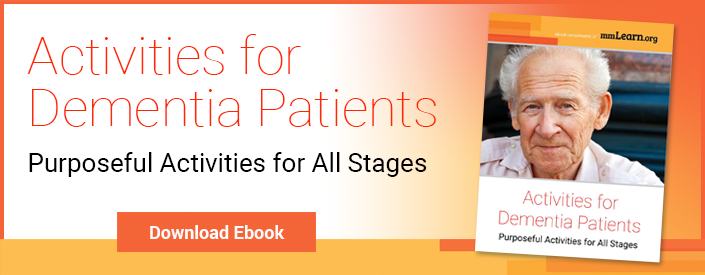 Millions of families are struggling to care for a loved one with dementia. And because dementia sometimes affects people’s ability to communicate, it’s not always clear to us what is happening to the brains and bodies of those we love.
Millions of families are struggling to care for a loved one with dementia. And because dementia sometimes affects people’s ability to communicate, it’s not always clear to us what is happening to the brains and bodies of those we love.
If you have a relative who has experienced a stroke, or “mini‑strokes,” they might develop a form of dementia called vascular dementia.
Does that mean they have Alzheimer’s Disease?
Not necessarily. Many people think of Alzheimer’s when they hear the term dementia because it is the most common form of dementia.
Dementia is an umbrella term that describes a group of symptoms involving memory, language, problem‑solving, and thinking skills.
Alzheimer’s Disease affects millions of people around the world. According to a 2021 article in Alzheimer’s & Dementia, approximately 6.2 million Americans age 65 and older are living with Alzheimer’s; it is the sixth leading cause of death in the US.
But fewer people know about other common kinds of dementia, such as Lewy body Dementia and vascular dementia. Scientists are learning that more and more people, especially those 85 and older, have something called “mixed dementia.”
Let’s take a closer look at vascular dementia.
What Is Vascular Dementia?
There are many terms medical professionals use to describe vascular dementia: cerebrovascular disease, vascular cognitive impairment (VCI), multi‑infarct dementia, and post‑stroke dementia.
Vascular dementia is the second most common form of dementia. Approximately 5‑10% of people with dementia have vascular dementia alone, but vascular dementia often combines with Alzheimer’s disease as a “mixed pathology.”
People with vascular dementia experience a reduced blood flow to certain regions of the brain. When those areas of the brain are deprived of oxygen and nutrients, the person experiences a decline in thinking skills.
Signs of Vascular Dementia
Is your aging loved one experiencing significant memory, communication or behavior changes?
Especially if they have experienced a stroke, you and their doctor should watch for problems with the following
- Memory
- Attention
- Communication
- Reasoning, judgement, and problem solving
- Visual perception
Other signs might be getting lost in a familiar place, using unusual words to describe everyday objects, not remembering names, losing old memories, or having trouble completing tasks independently.
While many of the symptoms of vascular dementia are similar to Alzheimer’s, the diseases progress differently, and have different causes.
Causes of Vascular Dementia
The cognitive decline often begins after a transient ischemic attack (TIA), often described as a mini‑stroke. These strokes happen in the front part of the brain, and if someone has a lot of them, they create vascular lesions that cause problems with cognitive function.
Small strokes can be hard to detect, but they are actually a more common cause of vascular dementia than large, classic strokes.
Differences between Alzheimer’s and Vascular Dementia
All types of dementia involve some level of memory loss. But not all memory loss means someone has dementia. In a previous article, we discussed the difference between “senior moments” and dementia — and the importance of discussing memory loss with family members and medical professionals.
People with vascular dementia sometimes have a slightly different type of memory loss than people with Alzheimer’s. A doctor might ask a patient to remember three words: apricot, table, and penny. After a distraction, the patient might not remember the words, but if the doctor prompts them with cues, like “fruit” or “coin.” they may respond correctly.
Another difference between these two types of dementia is the path of decline. People with Alzheimer’s often experience a gradual, continuous decline. However, the decline of vascular dementia is more like stairs — after a stroke there is a plateau, followed by another step.
But again, it’s not always easy to detect when small strokes happen, so this decline might be difficult to track.
Risk Factors
Can you prevent you or your loved ones from getting vascular dementia? Doctors have found that vascular dementia shares risk factors with vascular disease. Those risk factors include
- Smoking
- High blood pressure
- High cholesterol
- Lack of exercise
The Centers for Disease Control (CDC) lists the following factors as increasing the risk for dementia in general.
- Age —most cases affect people 65 and older
- Family history—people with parents or siblings with dementia
- Race/ethnicity—older African American people are twice more likely to have dementia than white folks, and Latinos are 1.5 times more likely
- Poor heart health—see the risk factors above
- Traumatic brain injury—head injuries increase the risk of dementia
Obviously, some of these risk factors are not something we can control. But staying active, eating healthy foods, and not smoking can help.
Caring for Someone with Vascular Dementia
In general, caring for someone with vascular dementia is similar to caring for someone with another form of dementia, or a mixed form.
We know that’s not easy. According to the National Alliance for Caregiving and AARP’s Caregiving in the U.S. 2020, 15.7 million people in the US are caring for someone with Alzheimer’s or dementia. Many caregivers are also working full or part time, and they report that caregiving has had negative impacts on their finances and health.
Many caregivers find it is useful to connect with the growing community of caregivers and to learn care strategies and dementia activities that can provide purpose and meaning for people with dementia.
Armed with this knowledge and compassion, we are able to make life more manageable for ourselves and our older loved ones.

